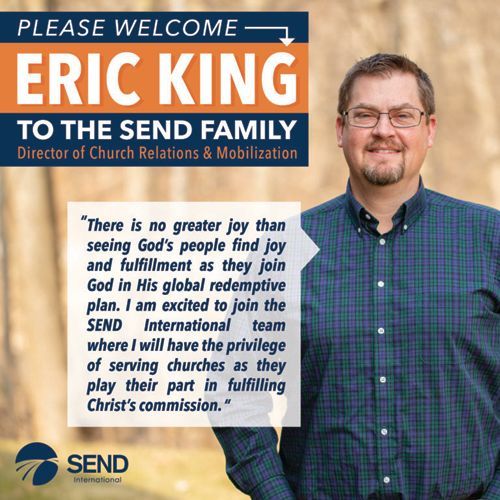
New mobilization director: We must break through the lie that missions is for super Christians
Eric King recently joined SEND International as Director of Church Relations & Mobilization. Eric has served as a missions pastor, a church planter, and in church mobilization and engagement with the International Mission Board. He and his wife, Mariah, have three teen-age children. In this interview, Eric tells the chilling story that God used to draw him into mission, discusses the challenges of recruiting new missionaries, and describes the ideal church/agency relationship.
Q. Your title is Director of Church Relations & Mobilization. Can you describe in layman’s terms what it is you do?
I have the privilege of leading a team that really loves God’s mission and also loves churches and people who are exploring their role in mission. We listen to what God’s doing in the life of a church and look for ways that we can come alongside in partnership. We don’t consider it our role at SEND International to send missionaries ourselves; rather, we assist local churches. We want to equip pastors and church leaders to be comfortable talking about mission in a way that their people can really grasp it and pursue a way to get involved.
Q. Why is it important to link mobilization of new missionaries and church relations?
At SEND, we believe the local church is how God has chosen to fulfill his mission around the world. So philosophically, it’s important for us to come alongside churches to send well. Practically speaking, those missionaries who are sent out well from local churches have a stronger potential of thriving in a new culture.
Q. What does “sending well” look like?
Sending well includes assessing, equipping, caring for missionaries while they’re overseas, and welcoming them back home. The church should know missionary applicants better than we do. Are they spiritually ready? Are they discipled in a way that they can thrive in a new culture? Are they equipped?
Sending well involves giving potential missionaries opportunities to lead and to disciple in their local context, and it’s being a spiritual anchor for on-field missionaries through prayer and support.

Q. What are some of the current challenges in recruiting new missionaries from North America?
I see at least four challenges:
- There are fewer and fewer evangelical Christians in the US, so the pool of potential candidates is smaller.
- Cultural tendencies can impact our worldview. So, cultural emphasis on consumerism, comfort, safety, and the idea of getting settled works against transplanting your life to another culture.
- A lot of people in church today didn’t come with a religious background, so they’re learning everything from scratch. There’s less awareness of mission in general and of the global needs and opportunities.
- For a long time, there’s been a belief that missionary work is for elite Christians. It’s hard for everyday Christians to imagine living in a new culture, because they think that’s for someone who’s not like them. We need to break through that lie. The truth is that God uses the normal, everyday Christians to do amazing things around the world.
Q. What are some exciting current trends in mission mobilization?
For a long time, we’ve thought of seminary or theologically trained believers going as missionaries. But there’s an emerging idea of missionaries taking alternate pathways. This might mean moving overseas for a job, or entrepreneurially minded believers helping to create jobs in order to open the doors for people to live incarnationally.
Another exciting trend is global mobilization. The West has sent out a lot of pioneer missionaries to places where a foundation for the gospel had not been laid. Now we are seeing many opportunities to focus attention on mobilizing and equipping believers in emerging sending nations. We’re figuring out what it looks like to facilitate others to be pioneering missionaries.
Q. SEND values unity in diversity. How can we send a more diverse missionary workforce from North America?
Internationally, SEND has a visible desire to be diverse in our teaming. When we look at the States, we’ve not done so well. We really want to position ourselves to listen carefully; we want to learn from our non-Anglo brothers and sisters and find ways that we’re creating barriers, structurally or relationally. We want to learn from others who are doing it well.
Q. Why should a church consider partnering with an organization, rather than just sending missionaries out on its own?
Biblically speaking, a church can send missionaries on its own and fulfill Christ’s Commission, but I think there is wisdom in partnering well with organizations that can help do that effectively.
An organization like SEND can provide a lot of assets and resources to help a church send well. We have the experience to help a church assess their members. We also offer training. How do you live and thrive and make disciples in a new culture? The experience of SEND can help a new missionary do that more effectively.
Partnering with an agency means that new missionaries are able to join a team of like-minded believers in places where there are few believers. Having a community helps missionaries thrive.
Working on a team also provides accountability. Considering all that local church leaders have on their plates, it can be hard to also maintain accountability for those who are far away.
Q. What would an ideal church/mission organization relationship look like?
Mutual respect. The organization understands the primary role of the local church in mission, and the local church understands the organization’s experience and the opportunity for the organization to serve them well. Picture a three-legged stool: You’ve got the church, the agency and the sent one working together for the sake of seeing more people come to know Christ, more people discipled, and more churches planted.
Practically speaking, agencies can handle logistics: Support, member care, insurance—all those things that we don’t get so excited about, but are really important.

Q. What drew you into missions?
I grew up with my parents working in inner-city ministry, and I’m very thankful for that heritage, but I didn’t have a lot of exposure to cross-cultural mission from a global perspective. My first out-of-country mission trip was to Brazil when I was in my 20s and working as a small group discipleship guy at my church. I saw that there was some semblance of truth, a little bit of the gospel, but it was mixed in with a lot of spiritism, traditions. People were just really trying to figure out how to get to God.
I stood on top of a mountain where there’s a 90-foot statue of Padre Cicero, a famous priest in that area. Many times, Brazilians will climb to the top of the statue and jump and kill themselves hoping to find favor with God. That’s really sad, that the truth is so liberating and easy, but there are people who don’t know it.
God changed my heart then, and I began to pursue mission in my life and the life of our church. I love Brazil, but God broke my heart for the nations and I began to discover that there are places that have even less access to the truth.
My wife also has a passion for missions. We’ve kept our life ready, so at any given time we could pick up and move overseas, but God’s kept us on the US side, helping others get involved. God’s been faithful to give us cross-cultural opportunities even here.
Q. What do you wish that you had known when you were a missions pastor that you know now, after working with the International Mission Board and now with SEND?
I’ve had so much exposure in the past several years to the many ways that everyday Christians can play a part in missions. I’m seeing opportunities that churches have to lead their people to join in mission that I would never have dreamed of back in the day when I was a mission pastor.
Q. You’ve spent the past six weeks getting to know SEND International. What have you come to appreciate about SEND?
SEND has a desire to be innovative and not stuck in “we’ve always done it that way.”
The people at SEND have genuine care and concern for all the people they have an opportunity to interact with. It’s a very relational organization.
SEND wants to be strategic but always while trying to discern where God’s leading. When a challenging idea comes up, the attitude I hear is, “That’s a hard idea. I’m not really sure I like it, but I definitely want to see if God’s in it, because if God’s in it, I want to do it.”
Let’s close with five quick questions.
1. How do you take your coffee? It’s based on the quality of the coffee. If it’s really good coffee, I’ll drink it black. At the SEND office, lots of cream.
2. What are you reading? A series of articles on the household of God. It’s a very intriguing cultural perspective on what the Bible means by house and family.
3. If you had one free day, what would you do? I would take my sons fishing.
4. Cats or dogs? Dogs. Are cats really an option?
5. Favorite Bible verse?
2 Corinthians 5:11-21

Additional Posts





